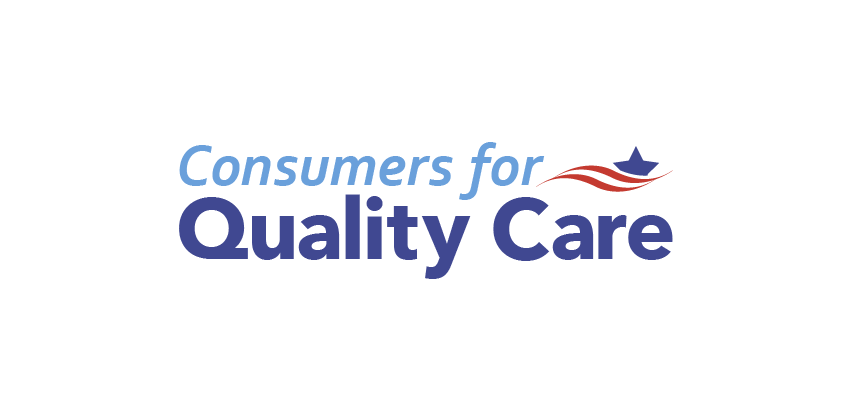CQC Urges DOJ, FTC and HHS to Protect Consumers and Promote Hospital Transparency
By Consumers for Quality Care, on June 7, 2024

For Immediate Release
June 7, 2024
Contact: press@consumers4qualitycare.org
CQC Urges DOJ, FTC and HHS to Protect Consumers and Promote Hospital Transparency
WASHINGTON, D.C. – Consumers for Quality Care (CQC), a coalition of advocates and former policy makers working to provide a voice for patients in the health care debate, issued the following response to the Justice Department, Federal Trade Commission, and Department of Health and Human Services Request for Information on consolidation in health care markets as part of their inquiry into the impacts of the corporate ownership trend in health care.
To Whom It May Concern,
Consumers for Quality Care (CQC), a coalition of advocates and former policy makers working to provide a voice for patients in the health care debate, appreciates the opportunity to provide further insights in response to the joint Request for Information (RFI) regarding private equity and corporations’ increasing control over health care.
Like many Americans, we are concerned about the potential adverse effects of corporate consolidation on patients’ health, quality of care, and affordability within the health care system. Medical debt is a pervasive issue, affecting millions of Americans. To remedy this situation, it is essential to address the root causes of medical debt and scrutinize the role of private equity in health care. CQC recognizes and applauds the significance of this inquiry, particularly in light of recent discussions and investigations into private equity’s role in health care transactions. CQC urges action be taken on the following issues:
- Private Equity in Health Care: Private equity is moving rapidly into health care and has led to safety lapses, rising prices, and increased consolidation in the industry. Private equity investors seek to maximize profits, often at the expense of patient care. They have been found to use tactics such as stripping hospital staffing to unsafe levels, running shortages of medical supplies and failing to maintain equipment, and price gouging patients from vulnerable populations. Private equity is increasingly targeting rural hospitals, where patients often have no other options for care. Too often, rural hospitals are being acquired by private equity investors, used to turn huge profits, and then closed or sold, leaving hundreds of employees jobless and leaving communities without access to care.
- Lower Costs, More Transparency Act: The Lower Costs, More Transparency Act represents a crucial step towards addressing key components of health care affordability and transparency. By enhancing price transparency, promoting site-neutrality, and implementing PBM reform, this legislation has the potential to protect consumers from harmful practices and ensure access to high-quality, affordable care. CQC applauds this progress and encourages robust enforcement of the provisions outlined in this act to safeguard patient interests and promote competition in the health care industry.
- Hospital Price Transparency: Transparency in hospital pricing is essential to empowering consumers to make informed decisions about their health care. Despite existing requirements for hospitals to disclose pricing information, compliance remains inadequate, hindering patients’ ability to compare costs and access affordable care. A lack of transparency can result in patients receiving unexpected, high medical bills, which often forces them into medical debt. CQC supports efforts to strengthen hospital price transparency requirements, promote greater accountability, and empower patients with the information needed to navigate the health care system effectively.
- Pharmacy Benefit Managers (PBMs) and Co-Pay Accumulator Programs (CAAPs): PBMs and CAAPs play a significant role in the health care system, yet their practices often lack transparency and accountability, contributing to rising drug costs and patient financial burdens. CQC supports increased regulatory oversight of PBMs and CAAPs to ensure fair and transparent pricing practices, safeguard patient access to affordable medications, and promote competition in the pharmaceutical market.
In conclusion, CQC urges the Department of Justice’s Antitrust Division, the Federal Trade Commission, and the Department of Health and Human Services to consider the insights provided and take decisive action to advance the objectives of the Lower Costs, More Transparency Act, enhance hospital price transparency, and address the challenges posed by PBMs and CAAPs and the dangers of private equity’s role in the health care industry.
By prioritizing patient welfare, promoting competition, and ensuring transparency and accountability in health care transactions, we can work towards a more equitable and accessible health care system for all Americans.
Sincerely,
Consumers for Quality Care
###
ABOUT
Consumers for Quality Care (CQC) is a coalition of advocates and former policymakers working to provide a voice for patients in the health care debate as they demand better care. CQC is led by a board of directors that includes the Honorable Donna Christensen, physician and former Member of Congress; Jim Manley, former senior advisor to Senators Edward Kennedy and Harry Reid; Jason Resendez, community advocate and health care strategist; and Mary L. Smith, former head of Indian Health Service.
